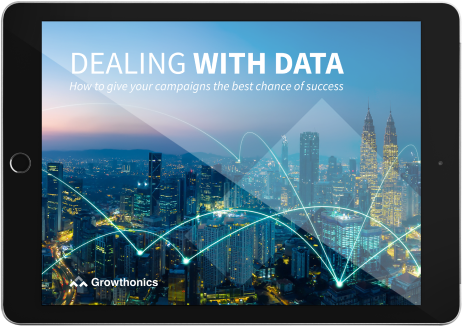DEALING WITH DATA
Collection, erosion, cleansing and enrichment
Trusted by more than 300 companies



What is data?
Data is information, especially facts or numbers, collected to be examined
and considered and used to help decision-making.
Data is information, especially facts or numbers, collected to be examined and considered and used to help decision-making.
Data is the new oil
It is widely cited that data is now the world’s most valuable resource, ahead of oil. And demand for it is
rising as companies realise the value data can bring to their organisations:
It is widely cited that data is now the world’s most valuable resource, ahead of oil. And demand for it is rising as companies realise the value data can bring to their organisations:
• Netflix saves $1 billion a year on customer retention by using data
• Big data analytics in banking is expected to grow at a rate of 22.97% per year until 2026
• Big data analytics in healthcare could be worth $67.8 billion by 2025
• In a 2018 survey, 97.2% of business leaders said they are investing in building or launching big data and AI initiatives
• The overall big data market is forecast to be worth almost $230 billion by 2025
Lead generation
Lead generation is the action or process of identifying and cultivating
potential customers for an organisation’s products or services.
Lead generation is the action or process of identifying and cultivating potential customers for an organisation’s products or services.
It is a growing priority (and challenge) for corporations:
• Some 53% of marketers spend at least half their budget on lead generation.
• More than six in 10 rank lead generation as their greatest challenge.
Why are leads so important?
• Companies which nurture leads generate 50% more sales at
33% lower costs.
• Increasing lead quality is the top priority for 68% of B2B
professionals.
• Outsourced lead generation generates 43% better results
than in-house lead generation.
• Companies which nurture leads generate 50% more sales at 33% lower costs.
• Increasing lead quality is the top priority for 68% of B2B professionals.
• Outsourced lead generation generates 43% better results than in-house lead generation.
Data and lead generation
Lead generation, by its very nature, relies on data.
Acting as the solid foundation of a scalable, predictable sales pipeline, data makes it easy for salespeople and marketers to
identify leads, segment their audience, execute targeted communication and guide customers through the sales funnel.
It is by no means a coincidence that companies with data-driven sales strategies boast better productivity and profitability.
Lead generation, by its very nature, relies on data.
Acting as the solid foundation of a scalable, predictable sales pipeline, data makes it easy for salespeople and marketers to identify leads, segment their audience, execute targeted communication and guide customers through the sales funnel.
It is by no means a coincidence that companies with data-driven sales strategies boast better productivity and profitability.



Data-driven organisations
are 23 times more likely to acquire customers.



Data-driven organisations are
six times as likely to retain customers and
19 times more likely to operate at a profit.



Data-driven organisations
are 23 times more likely to acquire customers.



Data-driven organisations are
six times as likely to retain customers and 19 times more likely to operate at a profit.
How to collect data


Typically, lead generation feeds off the input of numerous types of data. These include the name, job title, email
address, and phone number of contacts, ideally those of key decision makers who are able to sanction spending.
In today’s hyper-connected world, there has never been a better time to leverage the data needed to find the right target
clients and customers for your business.
Here are some of the data collection methods that are typically used:
Typically, lead generation feeds off the input of numerous types of data. These include the name, job title, email address, and phone number of contacts, ideally those of key decision makers who are able to sanction spending.
In today’s hyper-connected world, there has never been a better time to leverage the data needed to find the right target clients and customers for your business.
Here are some of the data collection methods that are typically used:



Data collection
forms



Polls



Questionnaires



Social media



Promotions



Gated content and
sign-up forms



Data collection
forms



Polls



Questionnaires



Social media



Promotions



Gated content and
sign-up forms
For more information see: Dealing with data: How to give your campaigns the best chance of success
Data erosion
Data erosion is an unavoidable challenge related to time sensitivity. It sees the gradual loss of accurate data including
company information, personal details and contact information as it becomes outdated and invalid.
Data decays as much as 3% every month.
Data erosion can emerge from:
Data erosion is an unavoidable challenge
related to time sensitivity. It sees the
gradual loss of accurate data including company
information, personal details and contact
information as it becomes outdated and invalid.
Data decays as much as 3% every month.
Data erosion can emerge from:





Job changes



Promotions



Company
relocation



Moving home



Mergers and
acquisitions



Rebranding



Liquidation



Job changes



Promotions



Company
relocation



Moving home



Mergers and
acquisitions



Rebranding



Liquidation
The impact of poor-quality data
Addressing data erosion and ensuring data quality is vital to a company’s bottom line:
• The average financial impact of poor-quality data on organisations is $9.7 million a year.
• Businesses in the US alone lose $3.1 trillion annually due to poor quality data.




“As organisations accelerate their digital business efforts, poor data quality is a
major contributor to a crisis in information trust and business value, negatively
impacting financial performance.”
“As organisations accelerate their digital business efforts, poor data quality is a major contributor to a crisis in information trust and business value, negatively impacting financial performance.”
– Ted Friedman, Vice President of Research, Gartner


Fast facts
• 50-75% of the success of a B2B marketing campaign is down to the accuracy of the data available.
• UK businesses waste £220 million sending mail to the wrong people every year.
• 40% of all B2B sales leads contain bad data.
• 42% of companies have struggled with inaccurate data.
• 43% of companies have seen data-led projects fail.
• 19% of companies have lost a customer by using inaccurate of incomplete information.


Ensuring data quality
You can have all the data in the world, but without a sound strategy, sales teams can
be left feeling like they’re sailing a vast ocean without a compass.
Make sure you are only collecting data that adds value. Data points vary in their usefulness, so consider what you really need to know.
Here are four steps to ensure your data is as accurate and complete as possible.
You can have all the data in the world, but without a sound strategy, sales teams can be left feeling like they’re sailing a vast ocean without a compass.
Make sure you are only collecting data that adds value. Data points vary in their usefulness, so consider what you really need to know.
Here are four steps to ensure your data is as accurate and complete as possible.



Account-based
profiling



Contact filter
segmentation



Contact information
research and verification



Double
verification



Account-based
profiling



Contact filter
segmentation



Contact information
research and verification



Double
verification
For more information see: Dealing with data: How to give your campaigns the best chance of success
Data Cleansing
Data cleansing is the process of detecting and correcting incomplete, incorrect, inaccurate
or outdated data.
Keeping data clean provides confidence. Not only will it tip the balance away from the costs
associated with data erosion and towards greater revenue opportunities, but it will also
allow you to interact with prospects and clients more creatively with personalised
approaches.
Data cleansing is the process of detecting and correcting incomplete, incorrect, inaccurate or outdated data.
Keeping data clean provides confidence. Not only will it tip the balance away from the costs associated with data erosion and towards greater revenue opportunities, but it will also allow you to interact with prospects and clients more creatively with personalised approaches.
• 51% of consumers expect companies will anticipate their needs and also make relevant suggestions before they make contact
• Personalised promotional emails produce 29% higher unique open rates and 41% higher click-through rates
• 72% of consumers only engage with personalised messaging
Data enrichment
Data enrichment is the process of bringing together internal data and authoritative external data to enhance and refine raw data. It is used to help
organisations make increasingly informed decisions.
By adding even more comprehensive data from a third party, companies can gain rich insights into their customers’ lives, persuasions and preferences.
Data enrichment can…



Save data validation
costs in the first
instance



Lead to greater sales



Maximise customer nurturing
through informed segmentation
and personalised marketing



Improve customer experience



Help to foster
meaningful customer
relationships



Save data validation
costs in the first
instance



Maximise customer nurturing through informed segmentation and personalised marketing



Improve customer experience



Lead to greater sales



Help to foster meaningful customer relationships


To better understand how you can optimise your use of
data and give your sales and marketing campaigns the
best chance of success
To better understand how you can optimise your use of data and give your sales and marketing campaigns the best chance of success



Find out how we can help
Our Offices
China Works,
Black Prince Road, Vauxhall,
London, SE1 7SJ
GROWTHONICS © 2022 ALL RIGHTS RESERVED




